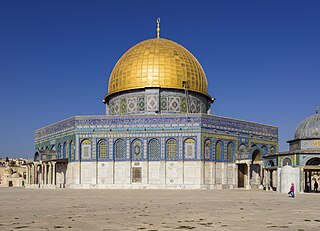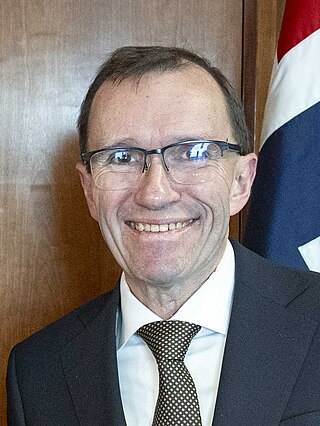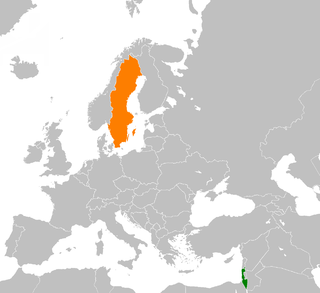 | |
Norway | Palestine |
|---|---|
Palestine has a diplomatic mission in Oslo, while Norway has a representative office in Al-Ram. Norway recognized the state of Palestine on the 28th of May. [1]
 | |
Norway | Palestine |
|---|---|
Palestine has a diplomatic mission in Oslo, while Norway has a representative office in Al-Ram. Norway recognized the state of Palestine on the 28th of May. [1]
The Labour Party, the ruling party in the 1940s, held a pro-Israel position. For the majority of non-Socialist and Christians Norwegians, the new Jewish state represented the realization of the Prophecies of the Old Testament. [2] Norway was described as the most pro-Israel of the three Nordic countries. [2] However, Labour's support for Israel was not indisputable, as in 1945 the party considered the establishment of a Jewish state to be "not possible and unfair". The party's proposal for the Jewish problem was non-Zionist, assimilating Jews into their respective European countries. [2]
After Knut Frydenlund became foreign minister in 1973, he played a crucial role in promoting Palestinian demands early in his political career. However, in 1974, Norway was among eight states voting against granting the PLO observer status in the United Nations General Assembly.
Norway helped orchestrate the 1993 Oslo Accords. For the signing of the Oslo Accords, the Norwegian Nobel Committee awarded the 1994 Nobel Peace Prize.
To communicate better with the PLO headquarters in Tunis, Norway also established an embassy in the Tunisian capital in 2007. [3]
The Norwegian government upgraded the Palestinian mission in Oslo to an embassy in December 2010 and called for a Palestinian state within the following year. [4] In January 2011, Foreign Minister Jonas Gahr Støre stated that if negotiations with Israel failed by September, Norway would recognize Palestine within the United Nations framework. [5] [6] After meeting with Abbas in July 2011, Støre said it was legitimate for Palestinians to seek a vote on statehood, emphasizing that people have the right to use UN institutions to clarify their status. [7]
In May 2017, a militant who took part in the 1978 Coastal Road massacre, where 38 Israeli civilians, including 13 children, were killed, was commemorated on a women's center by an agency of the Palestinian Authority. The center was built with the aid of the government of Norway and UN Women. [8] Norway's Foreign Minister demanded that Norway's funding for the building be repaid and its logo removed from the building. He said that "Norway will not allow itself to be associated with institutions that take the names of terrorists in this way". [9] [10] [11]
In June 2022, the Norwegian government announced the start of labelling products from settlements following the EU approach. [12]
On 27 October 2023, Norway was one of 121 countries to vote in favor of a General Assembly resolution calling for an immediate ceasefire to the fighting between Israel and Gaza. [13] In November, Prime Minister Jonas Gahr Støre rejected the Israeli aggression on Gaza and stated that it violated international laws of war, affirming the Palestinians' right to self-defense. [14]
On 16 November 2023, the Norwegian Parliament, the Storting, approved a resolution that calls on the government to be ready to recognise Palestine as an independent state. [15] On 23 December, Støre strongly criticized Israel's warfare. He added that the Gaza Strip is now virtually without any hospital, "This means that more than 2 million people who have an urgent need for medical assistance are in a critical situation, which we cannot accept." And it risks losing any solidarity as a result of the 7 October attack. [16]
Amid the Israel-Hamas war, the government of Norway recognized the State of Palestine on 28 May 2024. [17]

The Palestinian Authority, officially known as the Palestinian National Authority or the State of Palestine, is the Fatah-controlled government body that exercises partial civil control over West Bank areas "A" and "B" as a consequence of the 1993–1995 Oslo Accords. The Palestinian Authority controlled the Gaza Strip prior to the Palestinian elections of 2006 and the subsequent Gaza conflict between the Fatah and Hamas parties, when it lost control to Hamas; the PA continues to claim the Gaza Strip, although Hamas exercises de facto control. Since January 2013, the Palestinian Authority has used the name "State of Palestine" on official documents, although the United Nations continues to recognize the Palestinian Liberation Organization (PLO) as the "representative of the Palestinian people".

The history of the State of Palestine describes the creation and evolution of the State of Palestine in the West Bank and Gaza Strip. During the Mandatory period, numerous plans of partition of Palestine were proposed but without the agreement of all parties. In 1947, the United Nations Partition Plan for Palestine was voted for. The leaders of the Jewish Agency for Palestine accepted parts of the plan, while Arab leaders refused it. This triggered the 1947–1949 Palestine war and led, in 1948, to the establishment of the state of Israel on a part of Mandate Palestine as the Mandate came to an end.

The Oslo I Accord or Oslo I, officially called the Declaration of Principles on Interim Self-Government Arrangements or short Declaration of Principles (DOP), was an attempt in 1993 to set up a framework that would lead to the resolution of the ongoing Israeli–Palestinian conflict. It was the first face-to-face agreement between the government of Israel and the Palestine Liberation Organization (PLO).

The Palestinian territories are the two regions of the former British Mandate for Palestine that have been occupied by Israel since the Six-Day War of 1967, namely the West Bank and the Gaza Strip. The International Court of Justice (ICJ) has referred to the West Bank, including East Jerusalem, as "the Occupied Palestinian Territory", and this term was used as the legal definition by the ICJ in its advisory opinion of July 2004. The term occupied Palestinian territory was used by the United Nations and other international organizations between October 1999 and December 2012 to refer to areas controlled by the Palestinian National Authority, but from 2012, when Palestine was admitted as one of its non-member observer states, the United Nations started using exclusively the name State of Palestine. The European Union (EU) also uses the term "occupied Palestinian territory". The government of Israel and its supporters use the label "disputed territories" instead.

Jonas Gahr Støre is a Norwegian politician who has served as the 36th and current Prime Minister of Norway since 2021 and has been Leader of the Labour Party since 2014. He served under Prime Minister Jens Stoltenberg as Minister of Foreign Affairs from 2005 to 2012 and as Minister of Health and Care Services from 2012 to 2013. He has been a Member of the Storting for Oslo since 2009.

The status of Jerusalem has been described as "one of the most intractable issues in the Israeli–Palestinian conflict" due to the long-running territorial dispute between Israel and the Palestinians, both of which claim it as their capital city. Part of this issue of sovereignty is tied to concerns over access to holy sites in the Abrahamic religions; the current religious environment in Jerusalem is upheld by the "Status Quo" of the former Ottoman Empire. As the Israeli–Palestinian peace process has primarily navigated the option of a two-state solution, one of the largest points of contention has been East Jerusalem, which was part of the Jordanian-annexed West Bank until the beginning of the Israeli occupation in 1967.

Israel–New Zealand relations are the foreign relations between the State of Israel and New Zealand. While Israel has an embassy in Wellington, New Zealand's embassy in Ankara, Turkey is accredited to Israel. Diplomatic relations between the two countries date back to January 1949. New Zealand has exported a mixture of agricultural and manufactured goods to Israel. In return, Israel has exported a range of manufactured goods to New Zealand. Bilateral relations between the two countries have been complicated by issues such as the 2004 Israel–New Zealand passport scandal, United Nations Security Council Resolution 2334, and the Israel-Palestine conflict.

Espen Barth Eide is a Norwegian politician and political scientist. He is currently serving as the Minister of Foreign Affairs in Jonas Gahr Støre's government, having previously done so under Jens Stoltenberg. He has been a member of the Norwegian Parliament since 2017, representing the Labour Party. He was elected to this seat in the 2017 election, and reelected in the 2021 election. From 2017 to 2021, Eide was the Labour Party's spokesperson for Energy, Climate and Environment. He also served as Minister of Climate and the Environment between 2021 and 2023.

Mads Fredrik Gilbert is a Norwegian physician, humanitarian, activist, and politician for the Red Party. He is a specialist in anesthesiology and head of the emergency medicine department at the University Hospital of North Norway and Professor of emergency medicine at the University of Tromsø.

Israel–Thailand relations refers to diplomatic and cultural ties between the State of Israel and the Kingdom of Thailand. The countries have had official relations since June 1954. The Israeli embassy in Bangkok was established in 1958. Since 1996, Thailand has had an embassy in Tel Aviv. Thailand and Israel share a close and friendly relationship, and cooperate on many fields. People-to-people relations between the two countries are also good, as thousands of Thais are employed in Israel, and millions of Israelis have visited and continue to visit Thailand.

Israel–Norway relations are the bilateral relations between Israel and Norway. Norway was one of the first countries to recognize Israel, doing so on 4 February 1949.

Israel–Sweden relations refers to the bilateral relations between Israel and Sweden. Israel has an embassy in Stockholm while Sweden has an embassy in Tel Aviv, a Consulate General in Jerusalem and honorary consulates in Eilat and Haifa. The diplomatic relations between the two countries were briefly damaged when Sweden became the first member of the European Union to recognize the State of Palestine in 2014. Previously, other members had recognized Palestine, but that was before they joined the EU.

The bilateral relations between the State of Palestine and Russia have a complex history, deeply interwoven with Russian and Soviet relations with the Israeli enterprise, Palestinian nationalism, and Third World national liberation movements. Between 1956 and 1990, Soviet-Palestinian relations were part of the then ongoing Soviet-American confrontation.

China–Palestine relations, also referred to as Sino–Palestinian relations, encompass the long bilateral relationship between China and Palestine dating back from the early years of the Cold War.

Political relations between the State of Palestine and the United States have been complex and strained since the 1960s. While the U.S. does not recognize the State of Palestine, it recognizes the Palestine Liberation Organization (PLO) as the legitimate representative entity for the Palestinian people; following the Oslo Accords, it recognized the Palestinian National Authority as the legitimate Palestinian government of the Palestinian territories.

Relations between the European Union and the Palestine Liberation Organisation (PLO) were established in 1975 as part of the Euro-Arab Dialogue. The EU is a member of the Quartet and is the single largest donor of foreign aid to the Palestinian Authority.

The Oslo Accords are a pair of interim agreements between Israel and the Palestine Liberation Organization (PLO): the Oslo I Accord, signed in Washington, D.C., in 1993; and the Oslo II Accord, signed in Taba, Egypt, in 1995. They marked the start of the Oslo process, a peace process aimed at achieving a peace treaty based on Resolution 242 and Resolution 338 of the United Nations Security Council. The Oslo process began after secret negotiations in Oslo, Norway, resulting in both the recognition of Israel by the PLO and the recognition by Israel of the PLO as the representative of the Palestinian people and as a partner in bilateral negotiations.

Iceland–Israel relations refers to the diplomatic relations between Iceland and Israel. Both nations are members of the Organisation for Economic Co-operation and Development and the World Trade Organization.

The Trump peace plan, officially titled "Peace to Prosperity: A Vision to Improve the Lives of the Palestinian and Israeli People", was a proposal by the Trump administration to resolve the Israeli–Palestinian conflict. President Donald Trump formally unveiled the plan in a White House press conference alongside Israeli Prime Minister Benjamin Netanyahu on 28 January 2020. The plan had been delayed by two years and previously rejected by the Palestinians, who were not invited to the meeting.

Palestine–Spain relations are the bilateral and diplomatic relations between these two countries. Palestine has an embassy in Madrid. Spain has a consulate general in East Jerusalem that serves the West Bank, Gaza and Jerusalem. Spain recognised the state of Palestine on 28 May 2024.